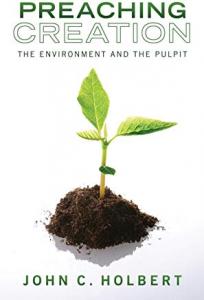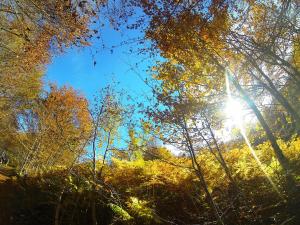 “Divinity is not playful,” claims Annie Dillard in her fabulous 1975 Pulitzer-Prize winning Pilgrim at Tinker Creek. This lovely book, one of my very favorite reads of the past 50 years, has energized me about the natural world in more ways than I can count. Still, I must disagree with her in this quoted point; I think divinity is in fact quite playful, as She/He creates and sustains the cosmos. Such playfulness is more than evident in the extraordinary passage found at Proverbs 8:22-31. Such sportive activity on the part of God may only be seen through a very careful translation of these lines that have much to teach us about our relationships to the natural world.
“Divinity is not playful,” claims Annie Dillard in her fabulous 1975 Pulitzer-Prize winning Pilgrim at Tinker Creek. This lovely book, one of my very favorite reads of the past 50 years, has energized me about the natural world in more ways than I can count. Still, I must disagree with her in this quoted point; I think divinity is in fact quite playful, as She/He creates and sustains the cosmos. Such playfulness is more than evident in the extraordinary passage found at Proverbs 8:22-31. Such sportive activity on the part of God may only be seen through a very careful translation of these lines that have much to teach us about our relationships to the natural world.
22) YHWH begat me at the beginning of God’s way, God’s most ancient work from long ago.
23) Long ago, I was poured out, first, before the ancient earth.
If one checks the NRSV translation, one will see some significant differences. Instead of “begat,” NRSV reads the more generic “created”. However, at both Genesis 4:1 and 14:19,22, the verb clearly means begat, the act of human sexuality resulting in the feminine activity of giving birth. So I think it means that here. For my “poured out” in the next verse the NRSV has “set up,” a possible reading; but with the feminine birthing image of 8:22, the translation “poured out” adds to the image of birthing, perhaps a portrait of the breaking of the waters that precedes the coming forth of a child. (For other divine feminine imagery see Is.42:14, 66:12-13.) The verses say quite explicitly that at the very “beginning” (the first word of Genesis) of God’s way, God’s activity in creation, even before the creation of earth, God birthed Woman Wisdom.
The image continues in 8:24.
24) When there was no Tehom I was birthed, before there were springs awash with water.
I have retained the Hebrew word Tehom since its translation is difficult if not impossible. It is certainly an echo of the more ancient Babylonian tale of the creation of the world, when the goddess of the salt water, Tiamat, (note the identical consonants) mates with the god of the fresh water, Apsu, to give birth to all the lesser gods and goddesses of the Babylonian pantheon. The author of Proverbs avers that even before the coming forth of Tiamat, the primal goddess, YHWH birthed Woman Wisdom, pouring her out of the divine womb long before any waters existed anywhere. NRSV reads Tehom as “depths” here, and “deep” in Gen.1. Tehom surely is the primeval waters that existed before the act of cosmic creation, but before all that, there was Woman Wisdom, the very first act of YHWH’s creative work. 8:25-26 continues the theme of the priority of Woman Wisdom.
Prov.8:27 shifts the scene a bit.
27) When God set up the sky, I was there;
when God drew a circle on the surface of Tehom.
As YHWH proceeded to set forth sea and land, boundaries for the former and foundations for the latter, Woman Wisdom witnessed all of it. But what exactly was she doing while God was performing all these familiar creative acts? Here is where the fun begins!
30) I was beside God as a confidant; I was a daily delight,
rejoicing before God always, 31) rejoicing in the whole creation,
and delighting in the human race.
The translation of “master worker,” in NRSV, where I have read “confidant,” is interesting but based only on a disputed text at Jer.52:15. I think the word “confidant” captures far better the role that Woman Wisdom plays in the divine act of creation. She is here advisor to God, sharing closely in the creative work, and then inviting her followers to join in the delight of that work. Woman Wisdom is rejoicing in that work but also delighting in it. Here is a playful confidant of God who is witness, advisor, and celebrator of God’s great work. I think Dillard’s solemnity that she finds in God’s creation does not account for the sheer pleasure and fun that Woman Wisdom displays as she both participates in and advises for that creation.

I would add that the NRSV’s reading at the end of vs.31a, “rejoicing in his (sic) inhabited world,” is far too restrictive, limiting the Woman’s work to concern for human creation only. The NRSV apparently assumes that “inhabited world” should be seen as a parallel member to “human race” at 31b. But in Hebrew the poet unusually links two nouns together, tevel and erets. The former noun is often found in parallel to the latter. Still, the latter word is the very common noun “earth,” while the former is much harder to pin down in meaning. It usually suggests a much larger place indicator than “earth,” perhaps “earth plus foundations.” Hence, to put these two words together, I suggest, may mean something like “whole creation,” as my translation indicates. Woman Wisdom surely delights in the human race, but equally finds joy in the entire creation of God.
Given her delight in the entire cosmos, is it possible that the poet of Proverbs had that famous text in mind, Gen.1:26, where God announces, “Let us make the human being in our image, according to our likeness?” Might that plural speech be a reference, according to Proverbs, to Woman Wisdom who has joined God in creation? If so, all creation, human and animal, has been created in the very image of God and Woman Wisdom all at once. Such a notion raises womankind to a mighty height, coexistent with God, who may readily be seen then as male and female, a more comprehensive understanding of God than we have usually gleaned from our biblical tradition.
This important portrait of Woman Wisdom has profound implications for our relationship to the natural environment. If creation is viewed through a female lens, where the birthing image is central, where the fecundity of God and Woman Wisdom suggests the ongoing creational process, just as she was birthed by God, so she could give birth to ever new possibilities for creation that she both sees and delights in. Furthermore, the image raises female activity to the very heart of creation, both ancient and ongoing creation. Thus, the work of the famous Proverbs woman at Prov.31:10-31, so long seen as how a woman should be as designed by a man (!), hard working, brilliant in economic affairs, mistress of the kitchen, the loom, and the raising of children, becomes in fact the very model of Woman Wisdom herself, the first of God’s creation, the actual co-creator with God. Society itself may be constituted anew with this extraordinary portrait of female power, not here a power over, as male society has long been seen, but power committed to the dynamics of genuine relationship. And if society may be constituted in that fashion, then our relationship to the environment may be characterized in the same way, no longer as master and slave (so Gen.1:26-28), but now as confidant and protective servant (Gen.2:15).
When Woman Wisdom issues her call to those of us who are persistent “simpletons,” unwilling to hear what she has to teach us, unwilling to change our ways to hers, she urges us to think anew about the creation that God has given to us so freely. At this point, we might look at a relatively little known passage from Isaiah 28:23-29. It begins with a call, not unlike the call of Woman Wisdom in Prov.9:3-6. “Listen and hear my voice! Pay attention and hear my words,” shouts an unnamed speaker. The voice continues by giving very practical advice from the work of a farmer to those who would live well in the world created by God. Among other things, the poet warns us not to treat the delicate dill and cumin as we would treat the grain we use for bread. We need to pound and crush the latter, but if we do that to the former, they are destroyed and become useless to us. Here we learn that not all we need to know comes from study in books or from learned teachers. A farmer’s field here illustrates the interdependence of wisdom and nature, of wisdom and creation.
The wisdom portions of the Bible have much to teach us about our relationships to nature, its delights and joys, its rich offerings of crucial knowledge and equally crucial sustenance for our lives. I urge you to explore the vast resources rarely plumbed from the Bible’s large strain of wisdom.
(Images from Wikimedia Commons)











